Afghans brave attacks to vote
Parliamentary polls close in Afghanistan amid persistent Taliban attacks and allegations of election fraud.
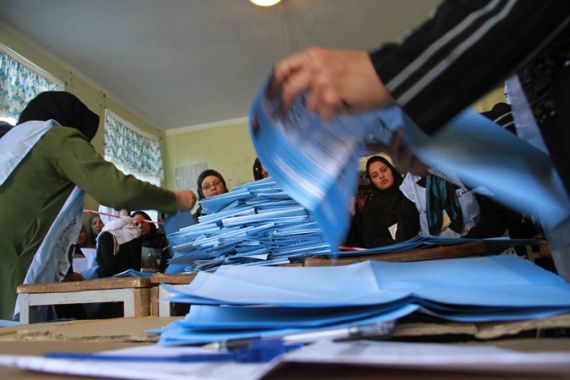
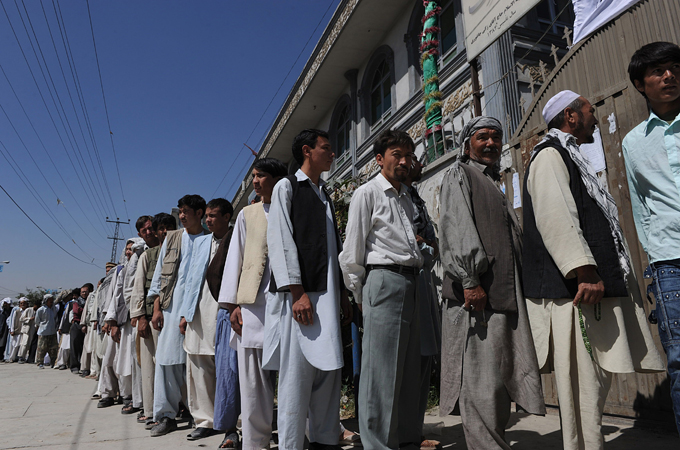 |
| More than 2,500 candidates are in the fray for 249 seats in the lower house of parliament [AFP] |
Afghans have cast their ballots in crucial parliamentary elections, held amid attacks across the country by Taliban fighters who sought to derail the vote.
At least 14 people were killed in the violence unleashed by the Taliban on Saturday, prompting many Afghans to stay away from the polls.
The Taliban claimed to have launched more than 100 separate attacks on the day, firing rockets in several cities and targeting a convoy carrying the governor of Kandahar, the Taliban heartland in the south of the country. The governor was not injured in the attack.
Despite the spate of attacks, Afghan security officials said overall security during the polling day had been better than expected.
Mohammad Zahir Azimi, the defence ministry spokesman, told a news conference that there had been no serious security incident linked to the election, and authorities said that the attacks that had taken place did not hamper voting, with 92 per cent of polling stations able to open.
Saturday’s voting was the second parliamentary election to be held in Afghanistan since the Taliban were toppled by the US-led invasion in 2001.
Violent day
Al Jazeera’s James Bays, reporting from Kabul, the Afghan capital, said that it was too early to judge the election. “This has been a difficult and violent day for Afghanistan,” he said. “Turnout here in Kabul looks certain to be lower than in recent elections. But it’s too early to judge this poll. Information still hasn’t come in from remote areas, and the final results won’t be known until the end of October.”
Voting got off to a slow start, stoking fears that the Taliban’s campaign of threats in the run-up to the poll had succeeded in scaring away voters.
But many Afghans did brave the rockets and bombs to cast their vote.”I want to show that I am not afraid of the Taliban,” Mohammad Zaman, who was first in line to vote in a southern suburb of Kabul, said.
- Afghan Elections 2010
- A messy election: Fraud in Afghanistan
- Interview: Suraya Pakzad, women’s rights activist
- Karzai versus the parliament?
- Searching for Plan B in Afghanistan
Interactive: Polling Centres
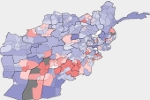
Interactive: Election Violence
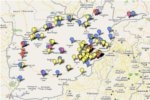
In Kandahar, a housewife called Fawzya admitted being afraid of the Taliban as she waited to cast her ballot. “I am scared. I know there are Taliban threats but I felt I had to come and vote,” she said.
Hamid Karzai, the Afghan president, who won an election marred by allegations of massive fraud a year ago, said that he hoped that the turnout in the polls would be high.
“We do hope there will be a high voter turnout, that people will come out and vote for the person, man or woman, of their choice without pressure,” he said, as he cast his ballot.
Voting patterns appeared to be largely dictated by ethnicity. In Kabul, dozens queued to vote outside polling stations in a Tajik area. But in areas dominated by Pashtuns, who mostly make up the Taliban, fewer turned out to vote.
More than 2,500 candidates are contesting 249 seats in the lower house of parliament, or Wolesi Jirga. Among them are 406 women contesting 68 seats reserved for them under legislation designed to better their rights.
Authorities said before the vote that they were expecting some violence during the process.
The Election Complaints Commission said it had received complaints of delayed opening, intimidation, ineligible voters, misuse of registration cards, proxy voting, poor ink quality and shortages of ballot papers.
Afghans reported being able to rub the ink off their fingers with little effort, despite officials saying that it was the best quality indelible ink available.
“In west Kabul the ink rubs off. After I voted, the ink rubbed off,” Mohammad Zahir Najafi Zada, one of the candidates standing for parliament, said.
Fake voting cards
In Jalalabad, observers said poll workers let people vote with fake registration cards, raising further questions over the integrity of the poll.
“The women coming here have so many cards that don’t have the stamp and are not real cards but still they are voting,” Nazreen, a monitor for the Free and Fair Election Foundation of Afghanistan, which has dispatched observers throughout the country, said.
Fake voter cards flooded into Afghanistan ahead of the balloting, but election officials had promised that poll workers were trained to spot them. Nato’s senior civilian representative said some fraud was expected, and that it would not necessarily undermine the vote.
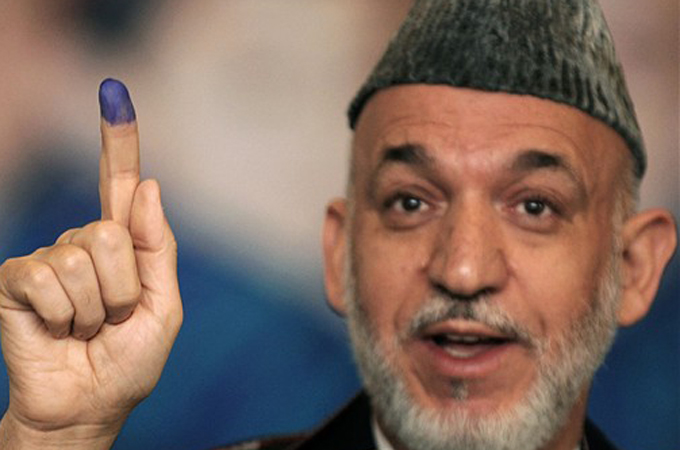 |
| Hamid Karzai was among the first to cast his vote [AFP] |
“The real issue is the scale of that and does it affect the result. And does it affect the credibility of the election, not in our eyes but in the eyes of the Afghan people,” Mark Sedwill said.
But Abdullah Abdullah, a former presidential rival of Karzai, said that fraud would delegitamise the parliament.
“If, as a result of massive fraud it does turn out to be a sort of rubber stamped parliament, at the hands of the government, then we will lose the opportunity for checks and balances which is expected from the parliament,” he said.
While campaigning has been personality driven, those who did come to vote early said lawlessness and corruption were their main concerns.
Turnout among the 10.5 million electorate is being seen as a key indicator of the poll’s success.
Turnout was an estimated 40 per cent based on preliminary data, Fazil Ahmad Manawi, the country’s senior election official, said.
Stressing that “this is not a final figure”, Manawi said 3,642,444 votes had been cast at 4,632 polling centres, adding: “This makes 40 per cent of the maximum number of voters.”
‘Small miracle’
Peter Galbraith, the former deputy UN envoy to Afghanistan, told Al Jazeera that Taliban threats may not be the only reason behind Afghans staying away from the polls. “I think the real reason voters are turned off is they don’t feel, rightly, that their votes are going to be counted, so why would you go risk your life in an election you think is going to be stolen anyhow,” he said.
But Staffan di Mistura, the UN’s top diplomat in Afghanistan described the elections as a “small miracle”.
“We have to give credit to the Afghans to have made a small miracle by actually having elections,” he said. “3.6 million people went to vote today. They showed courage and determination, and incidents took place. It was a violent day, but not much more violent than the previous elections. There were irregularities, and I’m sure we will be detecting more, probably widespread irregularities, but not masssive fraud.”
Polls officially closed at 4pm [1130 GMT] , but in areas of the capital with heavy turnout some shut earlier because of a shortage of ballots. Some polling stations remained open beyond the scheduled time to allow those in the queue to vote.
The laborious process of counting the ballots will now begin, with final results not due until October 31.